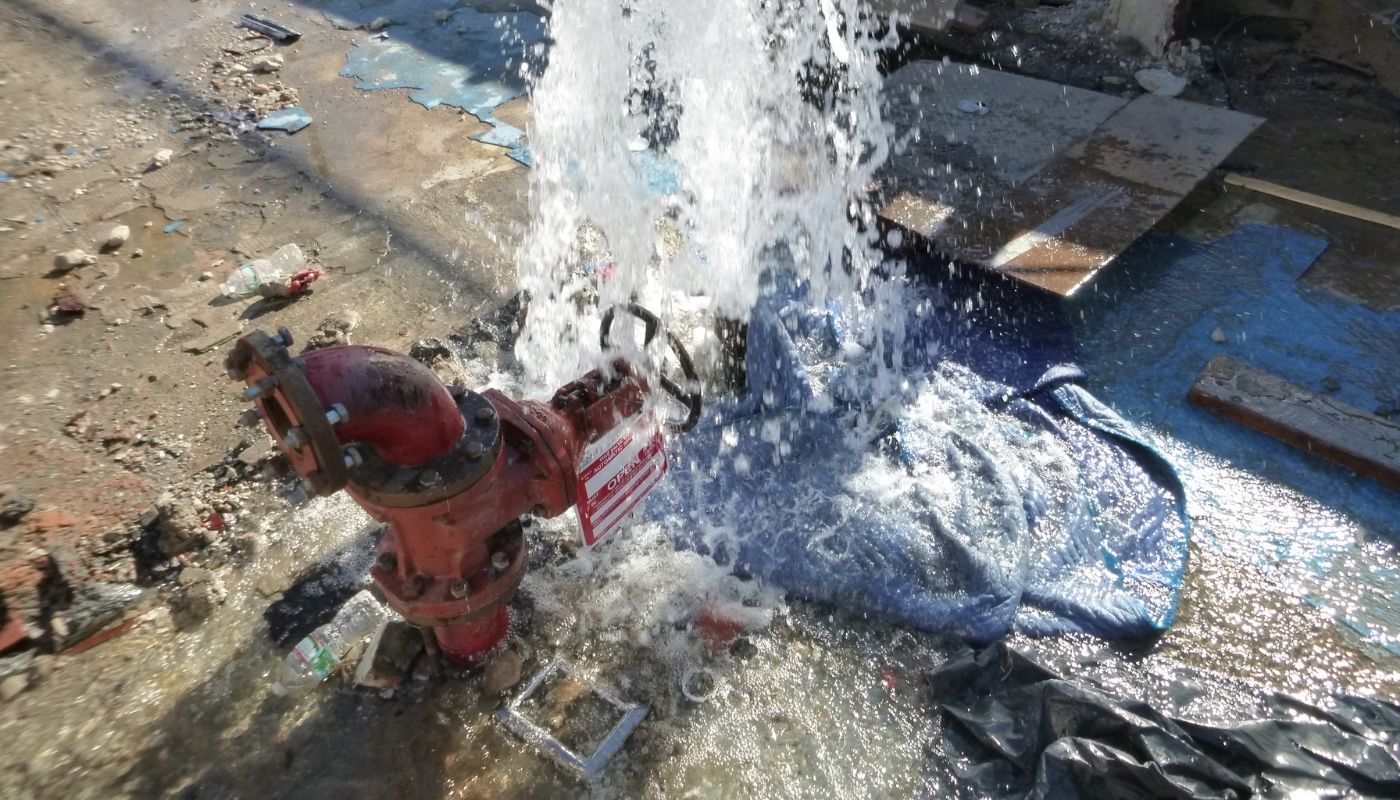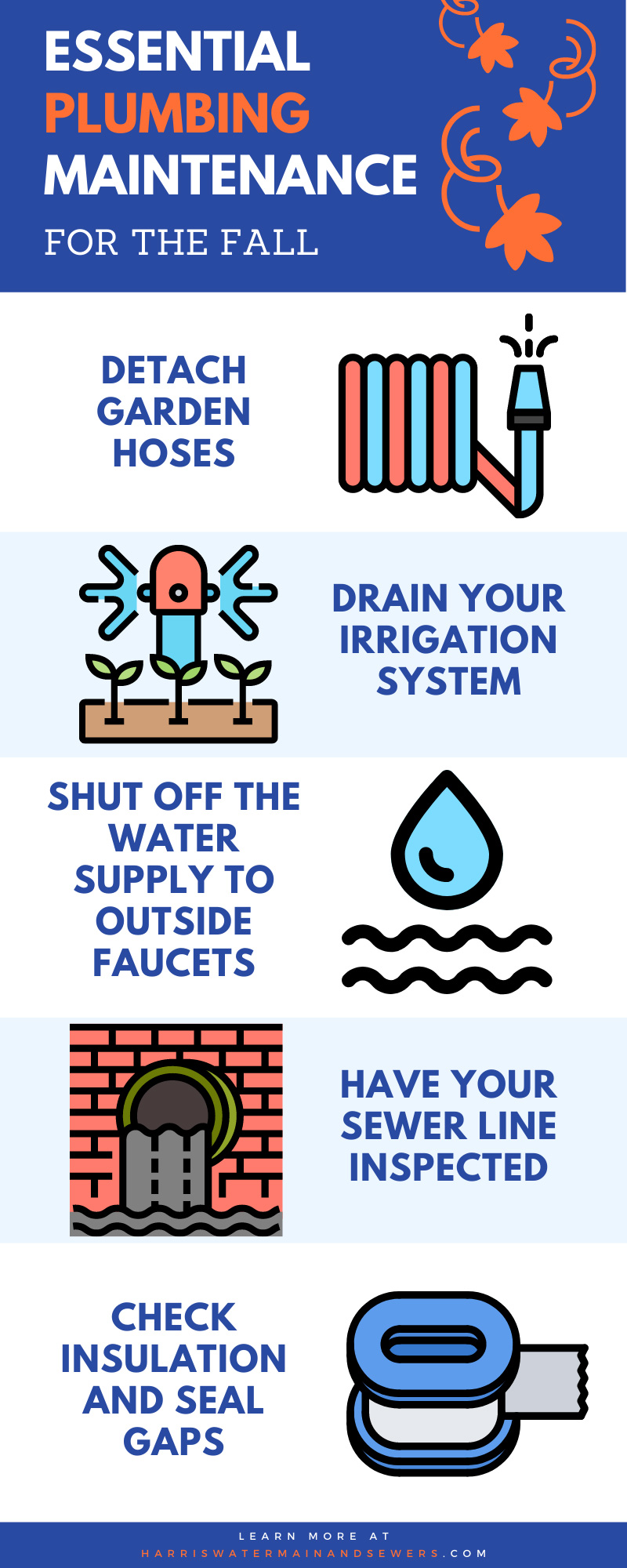When October comes, thoughts turn to leaf-peeping, pumpkins, and plumbing. Plumbing? Yes, those gorgeous October skies provide the perfect opportunity to take care of essential plumbing maintenance for the fall. As fall follows summer, so winter follows fall, and cold temperatures can cause major plumbing problems if you leave your home unprepared.
Detach Garden Hoses
After you’ve given your lawn and landscape its final watering for the season—and at least a week before the usual date of the first hard freeze—detach all your outside hoses from external faucets. Drain the hoses and put them away so that they won’t freeze when winter comes. Make sure the faucets are off and not leaking.
If you don’t already have them, fall is a good time to install exterior faucet covers or, better yet, to contact a licensed plumber to install frost-free faucets. These faucets extend back inside the house, so the water supply isn’t exposed to freezing temperatures on the outside. The valve that makes the water stop flowing when you turn off the faucet is all the way inside the heated home.
Drain Your Irrigation System
If you have a lawn sprinkler system installed in your yard, fall is the time to drain it. Don’t assume that the pipes to the sprinkler heads won’t freeze just because they’re underground. Sprinkler supply pipes aren’t usually buried deeply enough to prevent freezing. Contact a professional plumber to ensure the system is properly drained and winterized, especially if exposed pipes on the exterior of your home connect to the lawn sprinkler system.
Make sure the sprinkler heads and connections are intact and functioning properly. Lawn maintenance equipment can damage sprinkler heads that don’t fully retract into the ground. Yard work can also harm sprinkler supply pipes if they’re too close to the surface.
Shut Off the Water Supply to Outside Faucets
Find the pipes inside your home that supply your exterior faucets. There should be either a round-handled gate valve or a straight-handled ball valve that allows you shut off the water supply to the exterior faucets. A gate valve with the round handle lowers a bit of brass into the pipe when you turn it clockwise. A ball valve has a round ball inside with a hole to allow water to pass through when it’s open. When you turn the straight handle so that it’s perpendicular to the pipe, this rotates the ball and closes the hole, blocking water from traveling any further down the pipe. Shutting off the supply will prevent water from getting into the supply pipe and to the outside faucet, where it could freeze.
When you have shut off the water to the outside faucet, go back out and open the faucet to drain the pipe. When water stops coming out of the pipe (including drips), turn off the faucet again. This way, there won’t be any residual water close to or in the faucet outside your home that could cause the faucet or pipe to freeze and break.
Have Your Sewer Line Inspected
Dry summers cause trees to look for sources of water underground and send out roots to explore places where they might find water. Often, trees find sewer lines and roots invade the sewer pipes through tiny cracks. Those cracks will become bigger as the roots grow. Our licensed sewer and water contractors can conduct a camera inspection of your sewer line to detect if tree roots have invaded it. If roots have gotten into your sewer line, you’ll have to work with your specialized sewer repair and replacement plumber to determine the best way to clear the pipe. If the roots have grown too large, you may have to replace a section of the sewer line that runs from your home to the city sewer main under the street—or even the entire line. This requires a sewer contractor with the correct license for excavation and repair and familiarity with city codes and inspections that are required when working on a sewer connection.
Check Insulation and Seal Gaps
Conduct a close inspection of the exterior of your home, noting spaces around windows, places where pipes enter, and where gaps in caulking or weather stripping have appeared. Caulk doesn’t last forever, and one essential fall plumbing task is to reseal any gaps at the points where pipes enter your building. Check for gaps around windows, too. Cold drafts not only waste energy and drive up your heating bills, but also expose pipes to cold temperatures, risking damage.
Pipes in unheated spaces such as garages and attics and pipes that run along the perimeter of your home or through poorly insulated walls are at risk of freezing, too. Inspect pipes for proper insulation. If you don’t know what type of insulation is appropriate for which pipes, call a licensed plumber to help you determine what materials to use on which pipes.
Taking precautions in the fall to ensure your water and sewer pipes are protected from the cold is just one part of fall plumbing maintenance. You should also be wary of leaks and aging underground pipes. In New York City, aging infrastructure has caused ruptures in water mains, flooding streets.
Sometimes, tree roots and cycles of drought and heavy rain cause soil to shift underground, leaving sewer lines with less support and causing “sewer belly,” where the pipe begins to sag. If you’ve been experiencing sewer backups, it’s especially important to have your sewer lines inspected before the ground freezes. Sewer lines can be repaired or replaced at any time of year, but sewer backups in winter are especially unpleasant, when it’s too cold outside to open the windows to dispel foul odors. A licensed sewer line contractor can identify signs of sewer belly or a broken sewer line and offer solutions to repair or replace it.
Most winter plumbing problems happen because of frozen pipes on the exterior walls of homes. Proper preparation is critical to avoid costly damage. Prepare in the fall before the first hard freeze to ensure your home won’t suffer from frozen pipes, burst pipes, or flooding when the cold weather hits.






















